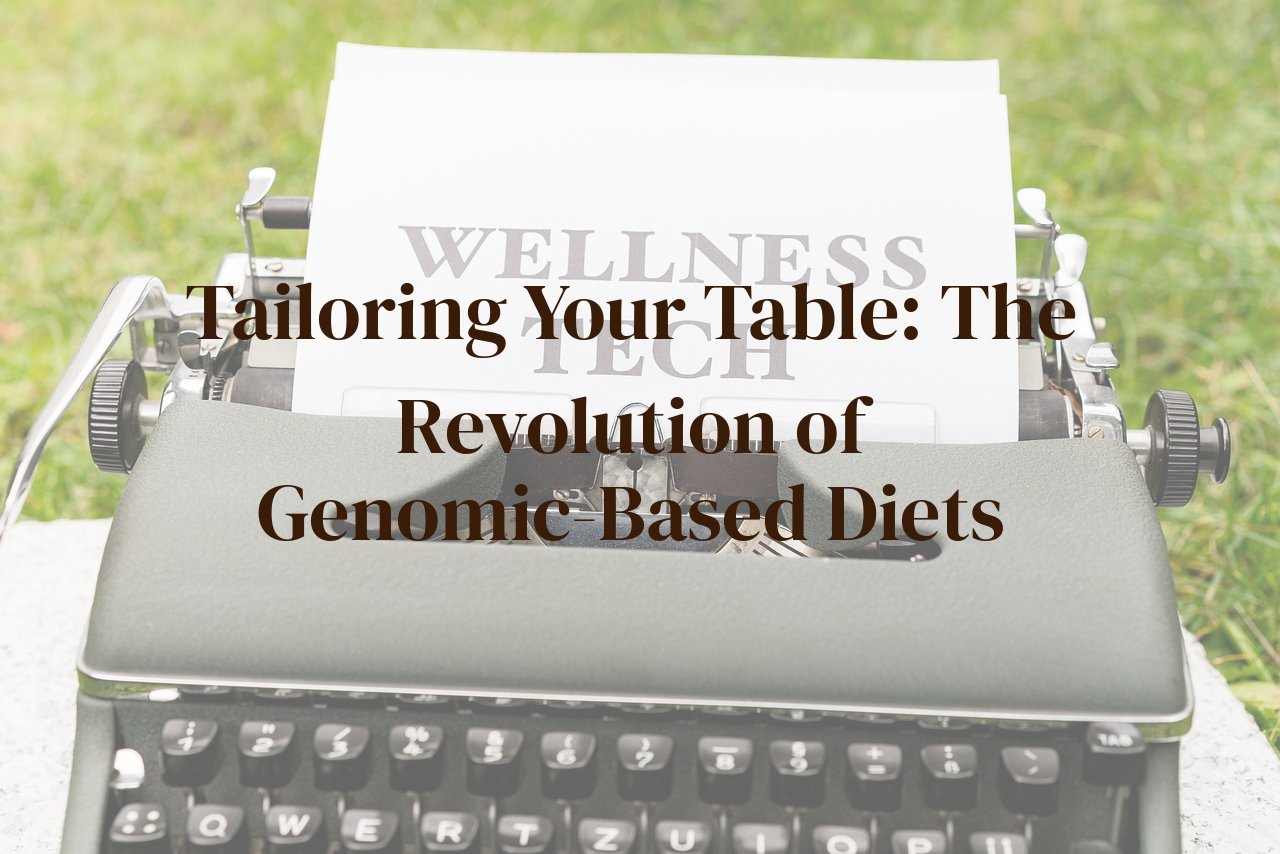
The plates we fill reflect our individual tastes, yet the latest scientific breakthroughs suggest they could soon mirror our genetic blueprints. Delving into the intricate world of ‘Personalized Nutrition’ and its foundation in genomics, this post will illuminate how cutting-edge research is transforming the way we think about food and health. Enter the era where dietary plans are not one-size-fits-all, but intricately designed outfits tailored to the genetic fabric of the individual.
As we dissect the connection between genetics and nutrition, readers can anticipate a thorough rundown on ways genomics could influence their eating habits and overall well-being. You’ll garner insights into customizing your diet to enhance your health, potentially sidestep hereditary diseases, and optimize your body’s performance, all through the lens of your unique DNA sequence.
Table of Contents
Decoding Your Dietary Destiny: Genetics Meets Nutrition
The interface of genetics and nutrition heralds a paradigm shift in how we perceive diet and wellness. The kaleidoscope of genetic markers, each a piece of the intricate puzzle that is our biological identity, plays a pivotal role in shaping our dietary needs and responses. Exploring this dynamic terrain, scientists have unveiled that single nucleotide polymorphisms (SNPs) – the most common type of genetic variation among people – directly influence nutrient absorption, metabolism, and even appetite. Recognizing such genetic predispositions enables us to optimize our health by tailoring dietary choices that align with our unique genetic makeup.
Take the fascinating case of lactose intolerance, where variants in the LCT gene determine an individual’s ability to digest lactose post-infancy. Those with a certain variant may need to reduce or eliminate dairy from their diet to avoid discomfort, replacing it with alternative sources of calcium and vitamin D for bone health. Similar genetic variations can affect our processing of other key nutrients such as fats, informing a personalized approach that might favor certain types of fats over others to maintain cardiovascular health.
Another intriguing aspect of the DNA-nutrition nexus is the gene-diet interaction in weight management. Polymorphisms in genes like FTO have been associated with a higher risk of obesity, which suggests individuals with these variants might require more personalized strategies for weight control. Such insights pave the way for precision nutrition, where the one-size-fits-all dietary guidelines give way to bespoke eating plans designed to work in harmony with one’s genetic framework. By ‘decoding’ these genetic signals, we can navigate the complex food landscape with a map that leads us to optimal health.
Thus, the fusion of genetics with nutrition is not just about eating according to your genetic profile, it’s about understanding how each bite we take can be a step towards a healthier, more vibrant existence. The revolution at our tables is poised to transform our relationship with food, making the act of nourishment a deeply personal and scientifically-informed journey into well-being.
The DNA Diet: Understanding Your Genomic Profile
Embarking on a journey towards tailored nutrition begins with understanding one’s genomic profile, a revolutionary way of interpreting the complex relationship between what we eat and our genetic makeup. The DNA diet demystifies how our bodies respond to different types of food and empowers us with the knowledge to make informed dietary choices. It’s essentially decoding the intricate dance between nutrients and our genes, which can sway the scales of health in myriad ways, nurturing our individual needs with unparalleled precision.
The first step in unraveling this is conducting comprehensive genetic testing. These tests reveal variations in genes related to metabolism, nutrient absorption, and the risk of developing certain conditions. For instance, a variation in the MTHFR gene can affect folic acid metabolism, or variations in the LCT gene can indicate lactose intolerance, thus flagging certain dairy products as undesirable for the individual in question. The test results, although technical, become the gospel by which one’s dietary commandments are written, crowning genetic insight as the sovereign of meal-planning realms.
Once an individual’s genomic profile is laid bare, it becomes possible to pinpoint the precise nutrients that complement or clash with their genetic predispositions. Factors such as how quickly one metabolizes caffeine or whether a person has an increased need for omega-3 fatty acids due to a gene variation can significantly direct dietary decisions. Moreover, understanding the nuances of one’s genetic responses to food further magnifies the importance of macronutrient ratios and the presence of certain micronutrients in daily meals, sculpting diets that are not just customized but are rather molecular masterpieces tailored to each individual’s DNA blueprint.
With this genomic insight, dietitians and nutrition professionals can forge a DNA diet plan that not only addresses current health status but also anticipates future dietary needs. This knowledge equips individuals with power—power to sidestep potential health hurdles through diet, power to optimize physical and mental well-being, and ultimately, the power to craft a life where food becomes an ally in their genetic narrative, not an adversary.
Imagine a world where every bite is a brush stroke on the canvas of our health, each meal a testament to the marriage of science and sustenance. Here, the DNA diet is not a one-size-fits-all regimen but a highly personalized nutrition tableau, drawn from the very essence of our being—our genome. It’s the ultimate fusion of who we are and what we eat, and it’s at our fingertips, ready to transform our tables into bastions of health-specific harmony.
Nutrients Intertwined with DNA: Personalizing Your Food Choices
The burgeoning field of nutritional genomics has opened a new chapter in healthcare, revealing the profound connection between the nutrients we consume and our genetic makeup. It’s an intimate dance of biology where the food choices we make may resonate with our DNA, sometimes harmoniously, other times discordantly. Personalizing your food choices based on your genetic profile isn’t a future fantasy—it’s a present possibility that weaves your unique genetic tapestry with the threads of nutritional science to tailor a diet that sings in tune with your body’s needs.
For instance, certain genetic variations can affect how we metabolize fatty acids, calling for a diet tailored in omega-3 and omega-6 ratios to maintain optimal health. Individuals carrying the APOE4 variant might benefit from being cautious with saturated fats, while another’s genotype may suggest a higher requirement for specific vitamins to circumvent metabolic bottlenecks. Imagine your body as a complex orchestra, your genes as the musicians, and nutrients as the musical notes they can play. Just as a musician’s capability influences the rendition of a symphony, so do your genes affect how nutrients are utilized and what dietary composition elicits your body’s best performance.
Moreover, variations in the MTHFR gene can lead to differences in folate metabolism, which has implications for cardiovascular health, pregnancy, and even mental wellness. A diet rich in folate could be contraindicated, or tailored supplementation may be in order, depending on the individual’s specific genetic variant. Similarly, individuals with variations in the LCT gene may need to adjust their intake of lactose to mitigate gastrointestinal discomfort and optimize nutrient absorption. Armed with these insights, a dietician can construct a highly personalized dietary plan that accommodates these nuances.
Translating genetic information into practical food choices sometimes requires novel thinking, such as considering the balance of microbiota in one’s gut—itself influenced by genetics and diet. Certain prebiotic fibers may be encouraged to foster a healthy microbiome, which in turn can influence everything from immunity to mood. The act of selecting probiotics also becomes less of a general recommendation and more of a targeted strategy to cater to one’s genetic predispositions to certain gut flora profiles.
In essence, embracing genomics in diet planning is about understanding and respecting the individuality of our biological blueprints. It’s about relinquishing one-size-fits-all dietary guidelines to empower ourselves with bespoke nutrition. This culinary revolution extends beyond the macronutrients and ventures into the terrain of bioactive compounds—phytonutrients, antioxidants, and other molecular benefactors that may align with your genome to support your health journey. The interplay between DNA and diet is complex, but as we continue to unravel its intricacies, we can harness its power to nourish our bodies not just adequately, but optimally.
From Science to Plate: Crafting Your Genomic Meal Plan
The leap from decoding genetic profiles to serving genomic-informed meals on our dining tables embodies a cutting-edge synthesis of science and everyday life. First, a comprehensive analysis of one’s genetic data can spotlight the peculiarities of an individual’s metabolic pathways and nutrient needs. For instance, one may have an innate predisposition for higher requirements of Omega-3 fatty acids, critical for cognitive function, based on specific gene variants. The resultant meal plan might thus feature an increased intake of fatty fish, like salmon, or plant sources such as flaxseeds.
Secondly, the genetic predisposition to metabolize certain vitamins at varying efficiencies leads to custom concentrations in daily meals. For example, someone with variations in the MTHFR gene affecting folic acid metabolism may benefit from enhanced levels of folate-rich foods, such as leafy greens, as part of their genomic meal plan to sufficiently meet their unique needs.
Moreover, genetic markers can also guide the optimal ratios of macronutrients—carbohydrates, proteins, and fats. This tailoring ensures that each individual’s diet is aligned with their genetic blueprint for efficient energy utilization, satiety, and maintenance of lean body mass. Integrating this level of personalization, one’s plate might balance these macronutrients uniquely; for instance, a higher protein composition for those with variants affecting protein utilization.
Additionally, the consideration of genetic factors influencing taste and food preferences could transform adherence to dietary plans. Understanding these nuances enables the crafting of meal plans that not only cater to health but also to the palate, ensuring a sustainable and enjoyable dietary experience.
Lastly, crafting a genomic meal plan doesn’t overlook the interactive role of gut microbiota. Recent advancements elucidate the impact of diet on the microbiome, which in turn affects gene expression and overall health. This bilateral relationship means that a personalized diet could positively shape one’s gut flora, further refining the optimization process of nutrient absorption and immune function.
Confection of one’s day-to-day diet with a genomic touch isn’t a simple task; it’s a deliberate and intricate process that translates one’s unique genetic makeup into a tangible, nourishing experience—serving as the culinary architect of one’s health trajectory.
Predictive Nutrition: Preventing Illness Through Personalized Diets
Imagine a world where we could anticipate the onset of diseases and counteract them through our dietary choices before the first symptoms even surface. Predictive Nutrition is a burgeoning field that combines the insights of genomic science with personalized diet planning to do just that: prevent illness by aligning what we eat with our genetic predispositions.
In the realm of preventative measures, cutting-edge research suggests that certain genetic variations affect nutrient absorption and metabolism, which in turn can influence disease risk. For instance, someone with a genetic predisposition for type 2 diabetes might benefit from a diet that’s tailored to control blood glucose levels more effectively than the general dietary recommendations.
It extends beyond mere avoidance of certain foods. Personalized diets delve into the optimization of nutrient intake — through micronutrient tweaking, for example. If an individual’s genetic analysis reveals a variant that affects vitamin D metabolism, their diet can be adjusted to include a higher vitamin D content, or recommend targeted supplementation to bolster their health.
Another exciting aspect is the gut-genome axis, where the focus is on prebiotics and probiotics to support a healthy microbiome, known to interact with our genome and influence health outcomes. Selecting foods that nurture beneficial gut bacteria can help attenuate inflammation and strengthen immune response, thus reducing the risk of a plethora of ailments. Tailored dietary fibers, fermented foods, and even specific strains of probiotics can become key elements in one’s personalized nutrition strategy.
Furthermore, predictive nutrition takes food as medicine from a philosophical concept to a practical application. It’s about harnessing the phytochemicals and bioactive compounds in foods that can interact with genetic expressions to bolster defense mechanisms against diseases like cancer, cardiovascular diseases, and autoimmune disorders. The interplay between bioactive food components and our genes is complex, but understanding this relationship can pave the way for highly targeted nutrition plans that work in concert with our body’s inherent capabilities.
This preventive, personalized approach to nutrition heralds a revolution in how we view and manage our health. It’s a shift from a one-size-fits-all diet paradigm to a tailored, strategic plan that empowers individuals with knowledge and choice, transforming the role of food from passive sustenance to an active ally in the fight against disease.
Conclusion
The voyage through the realm of genomics and nutrition highlights a future where diets are not just recommended based on general guidelines but are intricately connected to the individual’s genetic makeup. As we embrace the scientific strides in ‘Personalized Nutrition’, we become the architects of our health, crafting dietary plans that speak directly to our body’s needs. Imagine a world where every meal is a step towards optimal health—a future that may be just around the corner.



